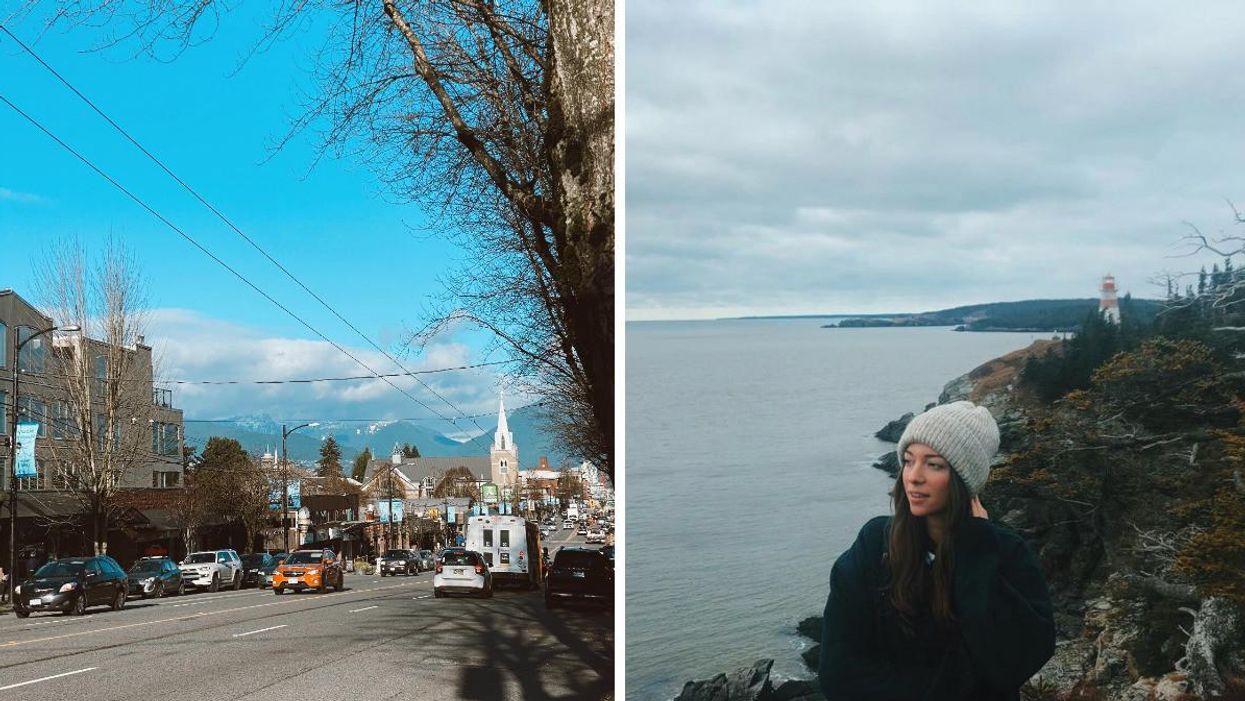How Canadians On The West & East Coast Acted So Differently During The Pandemic
Same country, but lots of differences.

Downtown Vancouver. Right: Morgan Leet.
The views expressed in this Opinion article are the author’s own and do not necessarily reflect the views of Narcity Media.
The West Coast of Canada is so different from the East Coast in a lot of ways, including how they responded to the COVID-19 pandemic.
Rewinding to March 2020, I'm sitting in my car driving home to New Brunswick from Ottawa, where I was going to university. Like many people, I remember that first week so clearly. I thought I was going home for two weeks to flatten the curve. As we now know, it's lasted a lot longer than that.
As soon as I got home I realized that New Brunswick was not messing around. It wasn't long before provincial borders were shut to the rest of Canada, and I couldn't go back to Ottawa to pack up the remainder of my stuff.
The Atlantic Bubble effect
Luckily — probably because of the tighter restrictions — New Brunswick's case numbers remained low throughout the first part of the pandemic, while other provinces like B.C. were hit harder.
They had the "Atlantic Bubble," which allowed residents to travel between Nova Scotia, P.E.I, Newfoundland and Labrador and New Brunswick.
Most of the country could travel from one province to the other without isolating, but not New Brunswick. It was stricter, but the Atlantic Bubble mostly worked (until it burst).
Fast forward to the fall of 2021, I moved to B.C., and I was a bit nervous coming from a small town without a huge threat of COVID-19 to the big city of Vancouver.
West Coasters seemed less phased
I'm not saying that people in B.C. didn't take COVID-19 seriously, because they definitely did, especially since the increased number of cases through December 2021 and January 2022, and the mask and proof of vaccination rules were reintroduced. The situation was being taken very seriously by many people.
However, I think that because B.C. had been dealing with a higher number of cases throughout the pandemic in comparison to the Atlantic provinces, they were already more adapted to it than people on the East Coast. To me, it seemed like "pandemic life'" was more normal on the West Coast.
East Coasters were super careful
Despite B.C. having had more COVID-19 cases, people seemed to be less phased by it. While New Brunswick had far fewer cases, people seemed to be more cautious there.
It was overwhelming in B.C., at first, to be even walking on the street with so many people. I remember going to my first yoga class in B.C., and being so shocked at how close others came to me. Everyone wore masks and followed guidelines, but there were small things like that that felt super strange to me.
This became even more clear as I went home again for Christmas in 2021, with the Omicron variant at the time spreading rapidly.
The cases were bad in both provinces, but B.C. actually had more restrictions. New Brunswick had some restrictions, such as a 10-person bubble, but not very many in comparison to other provinces.
The strange thing in New Brunswick was that even if you did go out for dinner, the restaurants were pretty much empty. I'd noticed this myself and had heard the same thing from friends — people were simply choosing not to go out, despite everything being open.
Similarly, if you went to the gym or to the mall, it was noticeably empty. Compare this to B.C. where you had some people online speaking out against the gym closures.
Why?
Of course, this is all just my observation, but it seemed clear to me that some East Coasters were more outwardly cautious even if they had fewer restrictions. On the flip side, I noticed that some West Coasters were more likely to follow restrictions and guidelines to a T.
I believe this is because on the East Coast we were so used to having low numbers that when they spiked, more people self-regulated.
In B.C. on the other hand, they have more people and way bigger numbers, and in a city like Vancouver, you inevitably were going to be more familiar with other people being around you.
I love both coasts, but it still surprises me every time I notice these differences in behaviours between the west and east coasts.
The opinions expressed in this article are the author's own and do not necessarily reflect the views of Narcity Media.
- BC Just Announced New Restrictions That Include A Ban On Some ... ›
- 9 Reasons Why I Moved Across Canada To BC That Will Make You ... ›
- 9 Things That Surprised Me When I Moved From The East Coast of ... ›
- BC COVID-19 Restrictions Were Just Updated & Here's Everything That Has Changed - Narcity ›
- 7 Things I Learned Trying To Find A Rental Property In BC While Living In New Brunswick - Narcity ›
- 9 Things Only East Coast Canadians Can Understand & Will Totally Bond Over - Narcity ›